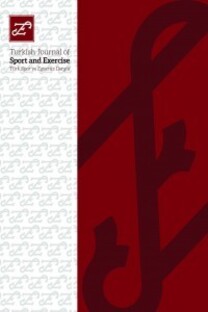Comparison of locus of control for students at school of physical education and sports with regard to some variables
This study deals with the comparisons of locus of control by some variables in students studying at the School of Physical Education and Sports. The scale for locus of control developed by Rotter was used herein. The research involved 150 female and 300 male participants. When compared to these students' locus of control in terms of genders and classes, it was observed that there was a statistical significant difference (P<0,05). However, no significant difference was found when these students' own departments were compared (P>0,05). As a result, it can be said that the variables such as the students' genders and grades showed a meaningful difference, suggesting that the locus of control was affected by the specified variables and these could direct the individuals towards the internal or external locus of control. Moreover, it is thought that the locus of control was not affected by this variable when the locus of control does not show any significant difference in the students' own departments.
Anahtar Kelimeler:
Locus of control; physical education.
-
This study deals with the comparisons of locus of control by some variables in students studying at the School of Physical Education and Sports. The scale for locus of control developed by Rotter was used herein. The research involved 150 female and 300 male participants. When compared to these students’ locus of control in terms of genders and classes, it was observed that there was a statistical significant difference (P0,05). As a result, it can be said that the variables such as the students’ genders and grades showed a meaningful difference, suggesting that the locus of control was affected by the specified variables and these could direct the individuals towards the internal or external locus of control. Moreover, it is thought that the locus of control was not affected by this variable when the locus of control does not show any significant difference in the students’ own departments
Keywords:
Locus of control physical education,
___
- Cüceloğlu D. İnsan ve Davranışı 14. Press, İstanbul: Remzi Publishing Company, 2005.
- Dağ İ. Kontrol odağı, öğrenilmiş güçlülük ve psikopatoloji ilişkileri. Ankara Üniversitesi Psikoloji Dergisi, 1992; 27: 1-9.
- Dönmez A. Denetim odağı temel araştırma alanları. Ankara Üniversitesi Eğitim Bilimleri Fakültesi Dergisi, 1987; 19: 260-275.
- Senemoğlu N. Gelişim Öğrenme ve Öğretim (kuramda uygulamaya), 9. Press, Ankara: Publishing Company, 2004.
- Tayfun A. Turizm eğitimi alan öğrencilerin denetim odaklarının çeşitli değişkenlere göre incelenmesi. Ankara, Gazi Üniversitesi Sosyal Bilimler Dergisi, 2005; 4: 45-76.
- Tümkaya S. İlkokul öğretmenlerindeki denetim odağı ve tükenmişlikle ilişkisi, IV. Ulusal Sınıf Öğretmenliği Sempozyumu, 15-16 Ekim 1998, Denizli. 7. Yanılmaz B. Öğretmen Adaylarında Denetim Odağının Çeşitli Değişkenlere Göre İncelenmesi. Yüksek Lisans Tezi. Karadeniz Teknik Üniversitesi Sosyal Bilimler Enstitüsü, 1999.
- Yeşilyaprak B. Denetim Odağı Kavramı, In; Deryakulu D, Kuzgun Y. Eğitimde Bireysel Farklılıklar. 11. Baskı, İstanbul, Nobel Yayınları, 2004; 320-345.
- Başlangıç: 1999
- Yayıncı: Selçuk Üniversitesi, Spor Bilimleri Fakültesi
Sayıdaki Diğer Makaleler
A research on mobbing behaviors football trainers face in club environment
Recep CENGIZ, Fatih YENEL, Hakan SUNAY
Effect of jogging and core training after supramaximal exercise on recovery
Tulin AKMAN, Menderes KABADAYI, Murat ELIOZ, Burak CILHOROZ, Pelin AKYOL
Comparison of curiosity levels of physical education teachers to the teachers of other branches
Ahmet SANIOGLU, Arife ALTIN, Mustafa USLU
The analysis of the last shots of the top-level tennis players in open tennis tournaments
İbrahim CAM, Bulut TURHAN, Zeynep ONAG
Gökhan ACAR, Mustafa KOC, Haluk KOC
